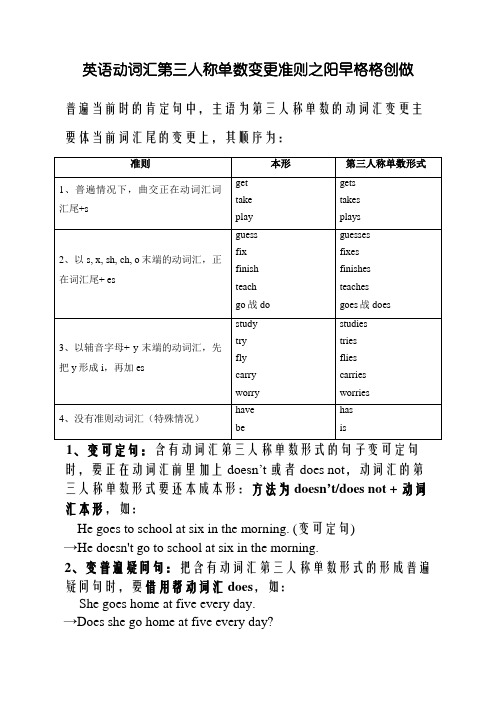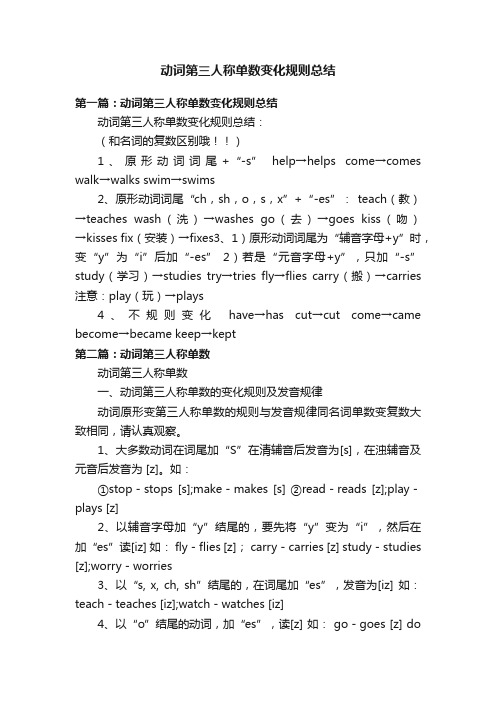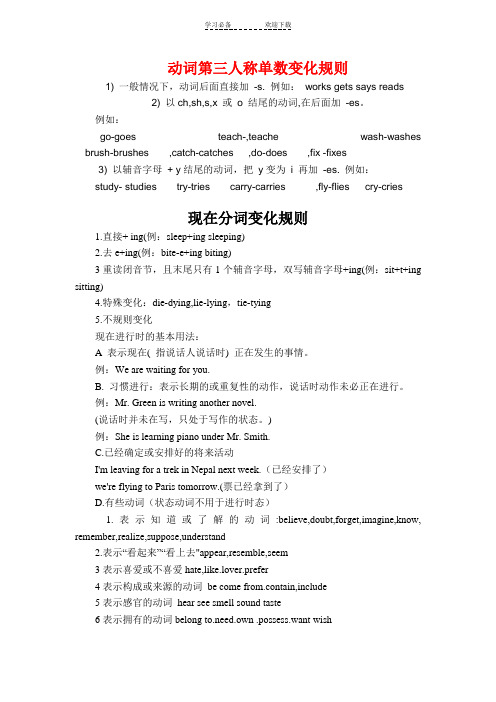动词第三人称单数变化规则如下89373演示教学
动词的各种形式变化规则课件公开课一等奖优质课大赛微课获奖课件

• 6. refer (referred, referring) 提到 7. forget (forgetting ) 忘掉 8. permit (permitted, permitting)允许 9. equip (equipped, equipping) 装备
• 注意: quarrel, signal, travel中l可双写 (英国英语)也可不双写(美国英语)
• shine-shone/shined-shone/shined
• sit-sat-sat
stand-stood-stood
• understand-understood-understood
• win-won-won
find-found-found
第18页
bet-bet-bet, cost-cost-cost, cut-cut-cut, hurt-hurt-hurt, let-let-let, put-put-put, read-read-read(音变), set-set-set, spread-spread-spread(传播)
5.其它动词直接加-ing。 speak→speaking(说)study→studying(学习) go→going(去)show(展示)→showing climb(爬, 攀)→climbing
第3页
• let→letting 让 hit→hitting 打、撞 cut→cutting 切、割 sit→sitting 坐 forget→forgetting 忘掉
第6页
• star--starring • win --winning 赢 • shop --shopping 购物 • stop -- stopping 停止 • drop -- dropping 落下 • dig -- digging 挖 • step -- stepping 踩, 踏 • trip -- tripping 绊倒 • rob -- robbing 抢劫
动词单三形式变化规则

动词单三形式变化规则
动词的单数第三人称形式变化规则一般如下:
1. 一般情况下,直接在动词词尾加上-s。
如:play → plays,
drink → drinks。
2. 动词以s、ss、sh、ch、x、o结尾时,加上-es。
如:pass → passes,miss → misses,wash → washes,watch → watches,fix → fixes,go → goes。
3. 动词以辅音字母+y结尾时,将y变为i,再加-es。
如:study → studies,fly → flies。
4. 动词以元音字母+y结尾时,直接加-s。
如:play → plays,
enjoy → enjoys。
5. 动词以辅音字母+o结尾时,直接加-es。
如:do → does,go → goes。
6. 部分动词没有规律可循,需要单独记忆。
如:be → is,have → has。
需要注意的是,有些动词在单数第三人称形式中发生形态变化,如:go → goes,do → does,have → has。
这些变化需要通过记忆来掌握。
动词第三人称单数的变化规则及练习备课讲稿

动词第三人称单数的变化规则及练习动词第三人称单数的变化规则及练习一、变化规则1、直接在动词后+s例如: like- likes play-plays2、以s, x, sh, ch, 接尾的动词:+es例如: wash-washes3、以辅音+o接尾的动词:+es例如: go-goes4、以辅音+y接尾的动词:变y为i+es例如: fly-flies动词短语:+s: Plays, skips, sings, gives, starts, likes,buys some toys, gets up comes back homemakes noodles, eats lunch drinks coffeebegins his class , practises the piano+es : watches TV brushes his teethgoes to bed goes to schooldoes my homework does some readingy→ i+ es:fly → flies study →studies注意:不规则变化:have-----has,be-------is,do-----does写出下列动词的第三人称单数drink ________ go _______ stay ________ make ________look _________ have_______ pass_______ carry ____come________ watch______ plant_______ fly ________study_______ brush________ do_________ teach_______二、请看下面两组句子,注意区分他们的共同点和不同点。
I go to school every day.I don't go to school every day.He goes to school every day.He doesn't go to school every day.Do you go to school every day?Yes, I do. (No, I don't)Does he go to school every day?Yes, he does. (No, he doesn't)注:1)第三人称单数用了 does 后面就不用动词的s形式了,而用动词原形.。
英语动词《第三人称单数形式》的变化规则

英语动词汇第三人称单数变更准则之阳早格格创做普遍当前时的肯定句中,主语为第三人称单数的动词汇变更主要体当前词汇尾的变更上,其顺序为:1、变可定句:含有动词汇第三人称单数形式的句子变可定句时,要正在动词汇前里加上doesn’t 或者does not,动词汇的第三人称单数形式要还本成本形:方法为doesn’t/does not + 动词汇本形,如:He goes to school at six in the morning. (变可定句)→He doesn't go to school at six in the morning.2、变普遍疑问句:把含有动词汇第三人称单数形式的形成普遍疑问句时,要借用帮动词汇does,如:She goes home at five every day.→Does she go home at five every day?--- Yes, she does./No, she doesn’t.哪些主语是第三人称单数?1、人称代词汇he, she, it;如:He likes watching TV. 他喜欢瞅电视.She has lunch at twelve. 她十两面吃午餐.It looks like a cat. 它瞅起去像只猫.2、单部分名、天名或者称呼做主语;是第三人称单数.如:Han Mei looks like her mother. 韩梅瞅起去像她的母亲.Beijing is in China. 北京正在华夏.Uncle Wang often makes cakes. 王叔叔时常干蛋糕.3、单数可数名词汇或者this / that / the+ 单数可数名词汇做主语时,是第三人称单数;A horse is a useful animal. 马是有用的动物.This book is yours. 那本书籍是您的.That car is red. 那辆小汽车是白色的.The cat is Lucy's. 只猫是露茜的.4、没有成数名词汇做主语时为第三人称单数.如:The milk is in the glass.牛奶正在玻璃杯里.The bread is very small. 那里包很小.The water is very cold. 那些火很凉..例题引路:1、写出下列动词汇的第三人称单数.drink ________ go _______ stay ________ make ________ look _________have_______ pass_______ carry _______ come________ watch________plant_______ fly ________ study_______ brush________ teach________2、用括号内动词汇的适合形式挖空.1.He often ________(have) dinner at home.2.We _____________ (not watch) TV on Monday.3.Nick ___________ (not go) to the zoo on Sunday.4.________ they __________ (like) the World Cup?5.What _________they often _________ (do) on Saturdays?6._________ your parents _________ (read) newspapers every day?7.There ________(be) some water in the bottle.8.My aunt _______(look) after her baby carefully.9.The child often _______(watch) TV in the evening.10. Mike’s sister ________ (cook) nice food. I _______ (like) eatingit very much.21._______ (do) your brother_______ (watch) TV in the evening? No,he_______ (not).3、选出精确的问案:1. She (like / likes) to play football.2. He (like / likes) drinking milk.3. I (like / likes) to watch TV.4. We (like / likes) to play badminton.5. They (like / likes) to sing songs.6. She (read / reads) books every day.7. He (play / plays) computer games every day.8. It (listen / listens) to the radio every day.9. Linda (draw / draws) pictures every day.10. Jane and Linda (play / plays) football every day.5、把下列句子形成可定句:1. We like playing football.2. Linda swims every day.3. They like playing games.4. My father reads newspaper in the evening.7、把下列句子形成疑问句,并干肯定战可定回问.1. My brother can ride a horse.4. We clean the classroom after school.________________________________________________________ ___。
动词第三人称单数变化规则总结

动词第三人称单数变化规则总结第一篇:动词第三人称单数变化规则总结动词第三人称单数变化规则总结:(和名词的复数区别哦!!)1、原形动词词尾+“-s” help→helps come→comes walk→walks swim→swims2、原形动词词尾“ch,sh,o,s,x”+“-es”:teach(教)→teaches wash(洗)→washes go(去)→goes kiss(吻)→kisses fix(安装)→fixes3、1)原形动词词尾为“辅音字母+y”时,变“y”为“i”后加“-es” 2)若是“元音字母+y”,只加“-s” study(学习)→studies try→tries fly→flies carry(搬)→carries 注意:play(玩)→plays4、不规则变化have→has cut→cut come→came become→became keep→kept第二篇:动词第三人称单数动词第三人称单数一、动词第三人称单数的变化规则及发音规律动词原形变第三人称单数的规则与发音规律同名词单数变复数大致相同,请认真观察。
1、大多数动词在词尾加“S”在清辅音后发音为[s],在浊辅音及元音后发音为 [z]。
如:①stop-stops [s];make-makes [s] ②read-reads [z];play-plays [z]2、以辅音字母加“y”结尾的,要先将“y”变为“i”,然后在加“es”读[iz] 如: fly-flies [z]; carry-carries [z] study-studies [z];worry-worries3、以“s, x, ch, sh”结尾的,在词尾加“es”,发音为[iz] 如:teach-teaches [iz];watch-watches [iz]4、以“o”结尾的动词,加“es”,读[z] 如: go-goes [z] do-does [z]下面几个动词变为单数时,原词的元音部分的发音发生了较大的变化,请注意记忆。
动词第三人称单数变化规则如下

动词第三人称单数变化规则1) 一般情况下,动词后面直接加-s. 例如:works gets says reads2) 以ch,sh,s,x 或o 结尾的动词,在后面加-es。
例如:go-goes teach-,teache wash-washes brush-brushes ,catch-catches ,do-does ,fix -fixes3) 以辅音字母+ y结尾的动词,把y变为i 再加-es. 例如:study- studies try-tries carry-carries ,fly-flies cry-cries现在分词变化规则1.直接+ ing(例:sleep+ing sleeping)2.去e+ing(例:bite-e+ing biting)3重读闭音节,且末尾只有1个辅音字母,双写辅音字母+ing(例:sit+t+ing sitting)4.特殊变化:die-dying,lie-lying,tie-tying5.不规则变化现在进行时的基本用法:A 表示现在( 指说话人说话时) 正在发生的事情。
例:We are waiting for you.B. 习惯进行:表示长期的或重复性的动作,说话时动作未必正在进行。
例:Mr. Green is writing another novel.(说话时并未在写,只处于写作的状态。
)例:She is learning piano under Mr. Smith.C.已经确定或安排好的将来活动I'm leaving for a trek in Nepal next week.(已经安排了)we're flying to Paris tomorrow.(票已经拿到了)D.有些动词(状态动词不用于进行时态)1.表示知道或了解的动词:believe,doubt,forget,imagine,know, remember,realize,suppose,understand2.表示“看起来”“看上去"appear,resemble,seem3表示喜爱或不喜爱hate,like.lover.prefer4表示构成或来源的动词be come from.contain,include5表示感官的动词hear see smell sound taste6表示拥有的动词belong to.need.own .possess.want wish1、现在进行时的构成现在进行时由"be+v-ing"构成。
动词变单三式的变化规则

动词变单三式的变化规则1.一般情况下,在动词后直接加-s例如:works gets says reads2.以s. x. sh. ch. o结尾,加-esgo-goes teach-,teache wash-washes,catch-catches ,do-does3.以“辅音字母+y”结尾,变y为i, 再加-esfly-flies study-studies4.不规则变化。
have——has一般现在时用法专练:一、写出下列动词的第三人称单数drink ________ go _______ stay ________ make ________look _________ have_______ pass_______ carry ____come________ watch______ plant_______ fly ________study_______ do_________ teach_______二、用括号内动词的适当形式填空。
1. He often ________(have) dinner at home.2. Daniel and Tommy _______(be) in Class One.3. We _______(not watch) TV on Monday.4. Nick _______(not go) to the zoo on Sunday.5. ______ they ________(like) the World Cup?6. What _______they often _______(do) on Saturdays?7. _______ your parents _______(read) newspapers every day?8. The girl _______(teach) us English on Sundays.9. She and I ________(take) a walk together every evening.10. There ________(be) some water in the bottle.11. Mike _______(like) cooking.12. They _______(have) the same hobby.13. My aunt _______(look) after her baby carefully.14. You always _______(do) your homework well.15. I _______(be) ill. I’m staying in bed.16. She _______(go) to school from Monday to Friday.17. Liu Tao _______(do) not like PE.18. The child often _______(watch) TV in the evening.19. Su Hai and Su Yang _______(have) eight lessons this term.20. -What day _______(be) it today? It’s Saturday.三、按照要求改写句子1. Daniel watches TV every evening.(改为否定句)___________________________________________________2. I do my homework every day.(改为一般疑问句,作否定回答)___________________________________________________ _________________________________3. She likes milk.(改为一般疑问句,作肯定回答)___________________________________________________ ________________________________4. Amy likes playing computer games.(改为一般疑问句,作否定回答)___________________________________________________ _________________________________________5. We go to school every morning.(改为否定句)___________________________________________________ ____6. He speaks English very well.(改为否定句)___________________________________________________7. I like taking photos in the park.(对划线部分提问)___________________________________________________ _____8. John comes from Canada.(对划线部分提问)___________________________________________________9. She is always a good student.(改为一般疑问句,作否定回答)___________________________________________________ _____________________________________10. Simon and Daniel like going skating.(改为否定句)___________________________________________________五、改错(划出错误的地方,将正确的写在横线上)1. Is your brother speak English? __________________2. Does he likes going fishing? __________________3. He likes play games after class. __________________4. Mr. Wu teachs us English. __________________5. She don’t do her homework on Sundays. _________________。
英语动词第三人称单数PPT讲稿

4.指示代词this, that作主语时,
是第三人称单数.如:
1)This is a pen.这是一支钢笔.
3)That isn’t an eraser.那不是 一块橡皮.
5. 不可数名词作主语时,为第 三人称单数.如:
1) Her hair is short.她是短 发。
1.Jack__lo_v_e_s__ (love) his
mother very much.
2.Mary and Lilyc_o_m__e__
(come) from the same
country.
is
3.The juice(果汁)_____ (be)
in tshoeufnrdidsge(冰箱).
• 8. [Do/Does]_____your dog walk
in the zoo?
• 9. [Do/Does]____ I have a big
nose?
• No, you _____[do not/does not].
• 11. [Do/Does]_____ their mothers
go shopping? No, they ____[do not/does not].
football? Yes, they ___[do/does].
• 6. [Do/Does]______ we have a
good teacher? Yes, we ____[do/does].
• 7. [Do/Does]_____ they jump
rope ? No, they ___[do not/does not].
school everyday? No, I don’t.
- 1、下载文档前请自行甄别文档内容的完整性,平台不提供额外的编辑、内容补充、找答案等附加服务。
- 2、"仅部分预览"的文档,不可在线预览部分如存在完整性等问题,可反馈申请退款(可完整预览的文档不适用该条件!)。
- 3、如文档侵犯您的权益,请联系客服反馈,我们会尽快为您处理(人工客服工作时间:9:00-18:30)。
动词第三人称单数变化规则如下89373
高三英语复习
动词第三人称单数变化规则
1) 一般情况下,动词后面直接加 -s. 例如: works gets says reads
2) 以ch,sh,s,x 或 o 结尾的动词,在后面加 -es。
例如:
go-goes teach-,teache wash-washes brush-brushes ,catch-
catches ,do-does ,fix -fixes
3) 以辅音字母 + y结尾的动词,把 y变为 i 再加 -es. 例如:
study- studies try-tries carry-carries ,fly-flies cry-cries
现在分词变化规则
1.直接+ ing(例:sleep+ing sleeping)
2.去e+ing(例:bite-e+ing biting)
3重读闭音节,且末尾只有1个辅音字母,双写辅音字母+ing(例:sit+t+ing sitting)
4.特殊变化:die-dying,lie-lying,tie-tying
3、现在分词的变化规则:
(1)一般情况下,直接在动词后加-ing
work ---- working
sleep ----- sleeping
study ----- studying
(2)动词以不发音的-e结尾,要去-e加-ing
take ----- taking
make ----- making
dance ----- dancing
(3)重读闭音节的动词,要双写词尾字母,再加-ing
cut ----- cutting
put ----- putting
begin ------ beginning
(4)以-ie结尾的动词,把变成y再加-ing
lie ----- lying
tie ----- tying
die ----- dying
① 一般单音节词末尾加er 和est
② 单音节词如果以e结尾,只加r 和
st
③ 闭音节单音节词如末尾只有一个辅音字母,
须先双写这个辅音字母,再加er和est ④ 少数以y,er(或ure),ow,ble 结尾的双音节词,末尾加er和est(以y结尾的词,如y前是辅音字母,把y 变成i,再加er和est,以e结尾的
词仍加r和st)
3. big bigger biggest
hot hotter hottest
thin thinner thinnest
4. easy easier easiest
busy busier busiest
happy happier happiest
5. valuable more valuable most valuable
dangerous more dangerous most dangerous
comfortable more comfortable most comfortable
1. 有几个形容词有特殊的比较级和最高级形式:
原级比较级最高级
good well better best
bad ill worse worst
many much more most
little less least far farther further farthest furthest
old older elder oldest eldest
2. 双音节词除了以“辅音+y”结尾的词外,还有以ow, er, le结尾的词,和个别其他双音节词,可以用加词尾的办法构成比较级和最高级:原级比较级最高级
narrow narrower narrowest
clever cleverer cleverest
simple simpler simplest
common commoner commonest
3. 也有少数单音节词可以加more和most的办法构成比较级和最高级:
原级比较级最高级
pleased more pleased most pleased
tired more tired most tired
glad more glad most glad
名词的复数形式
其它名词复数的规则变化
1) 以y结尾的专有名词,或元音字母+y 结尾的名词变复数时,直接加s变复数:如: two Marys the Henrys
monkey---monkeys holiday---holidays
比较:层楼:storey ---storeys story---stories
2) 以o 结尾的名词,变复数时:
a. 加s,如: photo---photos piano---pianos
radio---radios zoo---zoos;
b. 加es,如:potato--potatoes tomato--tomatoes
c. 均可,如:zero---zeros / zeroes
3) 以f或fe 结尾的名词变复数时:
a. 加s,如: belief---beliefs roof---roofs
safe---safes gulf---gulfs;
b. 去f,fe 加ves,如:half---halves
knife---knives leaf---leaves wolf---wolves
wife---wives life---lives thief---thieves;
c. 均可,如: handkerchief:
handkerchiefs / handkerchieves
动词变名词
1.在词尾加er,r ,双写加er 或or:
A. play _ player, sing _ singer, wait _ waiter , find _ finder,
thrill _ thriller,hunt-hunter
B. write _ writer, drive _ driver, come _ comer, explore _ explorer
dance _ dancer
C. run _ runner, win _ winner, rob _ robber, traval _ travaller
D. visit _ visitor, invent _ inventor,act-actor,advise-advisor
2. 在词尾加ing:
build _ building, draw _ drawing, end _ ending, begin _ beginning,
swim _ swimming, skate _ skating, feel _ feeling, say _ saying,
mean _ meaning, cross _ crossing, surf _ surfing, paint _ painting
3.在词尾加ion 或去e加ion:
A. decide _ decision, describe _ description, produce _ production, celebrate _ celebration,pronounce _ pronunciation, decorate _ decoration graduate _ graduation,frustrate - frustration,pollute _ pollution
contribute _ contribution, congratulate _ congratulation,
educate _ education,organize _ orgnization,donate _ donation, appreciate _ appreciation,operate _ operation, invite _ invitation
B. discuss _ discussion, invent _ invention, attract _ attraction
impress _ impression,inject _ injection,instruct _ instruction
4.其它:
know _ knowledge, please _ pleasure, enjoy _ enjoyment,
practise _ practice, die _ death, succeed _ success, weigh _ weight,
sit _ deat, change _ chance,enter _ entrance,fly _ flight,
rob _ robbery, discover _ discovery,faile _ failure,appear _ appearance, breathe _ breath。
